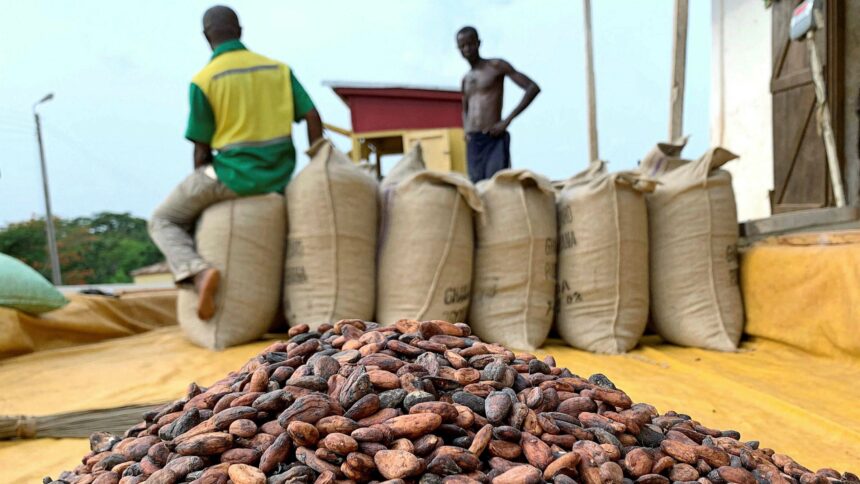Barely ten months into office, the Mahama administration finds itself caught between economic posturing and policy inconsistency. The latest announcement increasing the cocoa farmgate price to 58,000 cedis per metric ton is a perfect example of this confusion. On the surface, it looks like a bold, farmer-friendly move. But when examined closely, it exposes a government struggling to balance politics, currency management, and the hard realities of production economics.
In August, the administration fixed the 2025/2026 cocoa price at 51,660 cedis per ton when world prices stood at 8,176 dollars. Since then, global prices have dropped sharply by about 22 percent to around 6,443 dollars per ton. Yet the government, in an unplanned announcement, has increased the local price to 58,000 cedis. In dollar terms, that is roughly 4,640 dollars per ton, which is actually less than the August value of 4,783 dollars. So despite the headlines, farmers are not earning more — they are earning less in real terms.
The bigger question is why this administration would choose to raise prices now, when the market fundamentals point in the opposite direction. Some analysts see this as a hurried reaction to Côte d’Ivoire’s recent decision to raise its cocoa price to a record 2,800 CFA francs per kilogram, equivalent to 5,022 dollars per ton. The timing makes the move look less like a planned agricultural policy and more like political imitation.
But the real damage has come from the government’s own monetary decisions. In its first year, the Mahama administration has spent close to 2.8 billion dollars of Ghana’s trade surplus trying to force the exchange rate down to around 10 cedis to the dollar. This effort, aimed at creating the impression of a strong currency, has come at a steep cost to the country’s export sector, especially cocoa farmers. A strong cedi might sound patriotic, but it means farmers receive fewer cedis for every dollar earned from exports. Their input costs, however, continue to rise with inflation and the global market.
In short, the government’s exchange rate management has taxed producers to subsidise its image. The cocoa price increase, therefore, is not a show of goodwill to farmers. It is a cover-up, a way to hide the cracks created by months of poor economic planning. It is a political gesture meant to pacify farmers ahead of the next harvest, not a structural solution to their problems.
COCOBOD’s finances tell part of the story. Already burdened by debt, the board must now find funds to pay for this sudden increase at a time when global cocoa prices have fallen. That means either more borrowing or more pressure on government finances. For a country already struggling with limited fiscal space, this is a dangerous gamble. Yet the Mahama administration is pressing ahead, hoping the optics will outweigh the risks.
This approach mirrors a broader pattern that has defined the administration’s first ten months: policy driven by politics rather than data. From fuel pricing to exchange rate management, decisions seem designed to win applause rather than solve problems. The cocoa sector, which for decades has been the backbone of Ghana’s export economy, is now paying the price for this short-term thinking.
Farmers are already feeling the pinch. Fertilizer costs have doubled, inputs are harder to find, and production is being squeezed by ageing trees and poor irrigation. The government’s answer, instead of fixing these structural issues, is to throw higher nominal prices at the problem. But a higher cedi price means little when the currency’s value is falling and payments to farmers are delayed.
The Mahama administration came to power promising stability and relief for farmers. What it has delivered so far is confusion and contradiction. By spending billions to hold down the exchange rate, it weakened the very export base that could have strengthened the cedi naturally. By reacting to Côte d’Ivoire’s price hike instead of planning its own strategy, it signaled weakness rather than leadership. And by announcing a price increase in the middle of a global downturn, it exposed its own lack of coordination between fiscal and trade policy.
Ghana’s cocoa story should not be one of panic and politics. It should be one of planning and production. But under this administration, every move seems reactive. The new price may please some farmers in the short term, but it cannot hide the truth: Ghana’s cocoa industry is struggling, not because of global forces alone, but because of government missteps at home.
The Mahama administration still has time to correct course, but that will require honesty and tough choices. It must stop using exchange rate manipulation as an economic crutch. It must strengthen COCOBOD’s finances instead of overburdening it. Most importantly, it must invest in farm productivity and long-term reforms, not one-off price hikes meant for applause. Until then, every price announcement will sound like a promise, but feel like politics.




